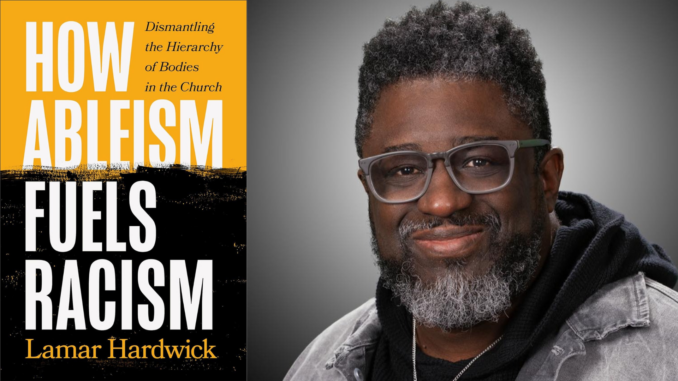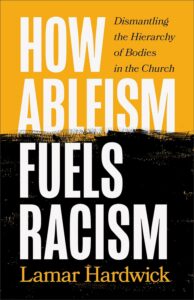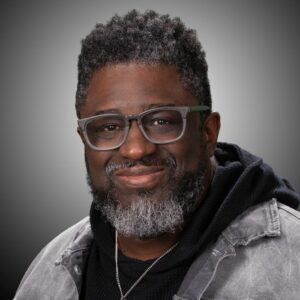
Racism is one of those forms of injustice that–rightfully–has been at the forefront of national (and international) conversation. But a form of injustice that often gets overlooked is injustice against a marginalized people group that is comprised of people of all ethnicities, genders, social classes, ages, and backgrounds. It’s the only marginalized group that, at one time or another, everyone will be part of. Disability theologian Dr. Lamar Hardwick uses the national conversation about racism to contextualize it as part of ableism, highlighting the intersection between ableism and racism. His latest book How Ableism Fuels Racism: Dismantling the Hierarchy of Bodies in the Church clearly lays out how a poor view of the body within Christianity has contributed to racism within the church. It’s a powerful book that comes from someone who, as a Black Autistic scholar, sits at the intersection of this topic both personally and professionally. I’ve been a follower of Dr. Hardwick and his writing for some time and was very happy to have him on the podcast program.
The Conversation | Lamar Hardwick
This transcript excerpt has been lightly edited for brevity and clarity. Get the full conversation by clicking the play button above and subscribing wherever you get your podcasts.
Josh Olds: There is, rightfully, within activist spheres, a huge focus on racial justice, but we don’t see that same emphasis on disability justice. By connecting the two, you draw attention to the fact that ableism isn’t a small subset of injustice that only affects a handful of people, but it’s actually much broader than that and it’s more of a foundational injustice that affects how we view racial justice. Talk to be about how you developing that line of thinking and how that led to this book.
Lamar Hardwick: Yeah, a lot of that is things that I’ve been sort of pondering and wrestling through for a while. I introduced it very lightly in Disability and the Church making the connection between disability and race talking about things like scientific racism. But this book was actually, the sort of the trajectory was a lot of work I was doing in my PhD program. And so I went into it knowing I wanted to study that more deeply. And so I used the opportunity as I was matriculating during the first year and a half of that program, to, you know, wrestle a little bit more deeply with how ableism actually affects racism, because what I saw was: we all kind of understand racism, but we understand it – and this is sort of a general definition – but it’s basically looking at people of color as being less than. What I was trying to understand is, what it was about people of color that white supremacy and early colonial theology…What was the designation that it gave Black people that made them feel that they were inferior? So it wasn’t just about, “Oh, I see you’re a different color, I think you’re less than me.” There was some sort of idea behind that, that there had to be a designation as to why. And so what you end up discovering is they begin to convince themselves and teach others that Black bodies were inherently disabled, mentally inferior, and they were in need of white supervision. So you see this connection between disability and race all throughout the early colonial period. I think if we’re going to understand racism, we’ve got to understand that the reason why it persists is because Black bodies were given a designation from which they weren’t allowed to escape from, and that was, Black bodies are inherently disabled or mentally inferior, which meant anything that they produce is inferior, any of their ideas are inferior and so it needed white supervision. But the root of that distinction was disability. And you see that all throughout history as you start to look at the connections that were made to justify racial slavery.
Josh Olds: So we move into modern times and the refrain might be “Well, that’s in the past. We don’t have to worry about that now.” How do you see that philosophy still showing itself in the church, in society, today?
Lamar Hardwick: So there’s several examples. And that’s kind of what I tried to do in the book, everything from healthcare, to employment, even to theology, is sort of still tainted by this idea that disability is inherently attached to minority bodies. And so one good example is this idea that, even in the present, there have been Christian leaders teaching that the historically Black church has inferior doctrine and teaching. And you hear that a lot, especially when it comes to things like liberation theology, when it comes to social justice. Usually, white evangelicalism pushes back by saying, you know, well, that’s not the gospel. You have these gatekeepers of what true Christianity is, at least in their minds, and what I point out is that a lot of these differences in doctrine are actually disability discrimination. Because it’s not just them using disability to talk about how the bodies of Black people are inferior. They use disability to justify feeling that the bodies of work that proceed from those communities are also inferior. So when this pastor says this – I think it was in 2016, or 2017, it resurfaced in 2020 – what I point out is that it is still pervasive and is still a disability issue, because what he’s essentially saying is that the bodies of work that come from minority bodies are spiritually inferior. And part of that is because of ableist ideas about Black bodies. And that is still attached to the idea that that disability was attached to Blackness.
The Book | How Ableism Fuels Racism
 Read our full review here.
Read our full review here.
As a Black autistic pastor and disability scholar, Lamar Hardwick lives at the intersection of disability, race, and religion. Tied to this reality, he heeded the call to write How Ableism Fuels Racism to help Christian communities engage in critical conversations about race by addressing issues of ableism.
Hardwick believes that ableism—the idea that certain bodies are better than others—and the disability discrimination fueled by this perspective are the root causes of racial bias and injustice in American culture and in the church. Here, he uses historical records, biblical interpretation, and disability studies to examine how ableism in America led to the creation of images, idols, and institutions that perpetuate both disability and racial discrimination.
He then goes a step further, calling the church into action to address the deep-seated issues of ableism that started it all and offering practical steps to help listeners dismantle ableism and racism both in attitude and practice.
The Author | Dr. Lamar Hardwick
 Lamar Hardwick (DMin, Liberty University) is the former lead pastor of Tri-Cities Church in Atlanta, Georgia, and the author of Disability and the Church: A Vision for Diversity and Inclusion. He is a graduate of the Yale Divinity School Clergy Scholar Program and a 2017 graduate of Georgia Forward’s Young Gamechangers program. Hardwick regularly writes and speaks on disability inclusion in the church. He has written for Huffington Post and BioLogos and is a frequent guest on radio shows and podcasts. In 2014, after years of silently struggling with social anxiety and sensory processing disorder, and a host of other significant issues, Dr. Hardwick was diagnosed with Autism Spectrum Disorder. He was 36 years old when diagnosed. His articles and blogs can also be found on his website.
Lamar Hardwick (DMin, Liberty University) is the former lead pastor of Tri-Cities Church in Atlanta, Georgia, and the author of Disability and the Church: A Vision for Diversity and Inclusion. He is a graduate of the Yale Divinity School Clergy Scholar Program and a 2017 graduate of Georgia Forward’s Young Gamechangers program. Hardwick regularly writes and speaks on disability inclusion in the church. He has written for Huffington Post and BioLogos and is a frequent guest on radio shows and podcasts. In 2014, after years of silently struggling with social anxiety and sensory processing disorder, and a host of other significant issues, Dr. Hardwick was diagnosed with Autism Spectrum Disorder. He was 36 years old when diagnosed. His articles and blogs can also be found on his website.
